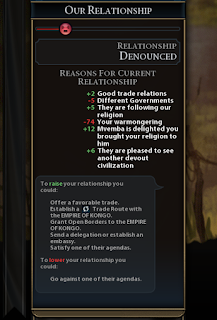However, there is something that is distinctly unfun. Specifically, Diplomacy and Warmongering.
Defensive Warmongering
In a recent game, America (AI)--my formally declared best friend--started a Surprise War on me in 3000 BC. By 2000 BC I had wiped America off the face of the planet because I mean, really, if I didn't they were just going to backstab me again and again. Now, I turned down them suing for peace because well, backstabbers, so I got a huge warmongering penalty because captured cities/capital. Meh.
Everybody denounced me (or course), and I checked my diplomacy values. I had netted -112 to my reputation due to Warmongering! For a war that America started and I finished. Now the thing to keep in mind is that's not a static value. Those numbers? They represent how far your relationship meter moves per turn. So I was getting +3 per turn because we had open borders, and -112 per turn due to Warmongering.
 |
| -74 basically outweighs everything else ever for the rest of time. |
All right, everyone hates me, great. Even worse, though, is the fact that number basically compounds over time because it's a per turn value. And that negative tapers off really slowly, regardless of time scale. What this means is that 3500 years later, my civilization still had a -74 Warmongering penalty to all civs, meaning any attempts at diplomacy were useless for the rest of the game. I still got denounced like clockwork every time their previous denunciations expired.
Yeah, okay, wiping somebody else out? That deserves some serious shrift from the other civs. Absolutely. But 3500 years and that's only halfway decayed? I mean, you look at a modern day example, Germany and World War II. They've basically managed to remove a real-world "warmongering" penalty in 80 years--so in Civ terms, given the time period, 80 turns, which in ancient times is 1600 years equivalent, so it's not even "realistic", let alone fun.
The Solution
Basically, the issue at hand is the warmongering penalty needs to decay based on time passed, not turns passed. A war in 2000 BC should have nearly 0 effect on diplomacy in 1500 AD. The Civ team tried to mimic that by reducing warmongering penalties in early history, but that's insufficient in my opinion.
It's also extremely unfun to be attacked and punished for defending myself. Yes, I could've just defended my territory and left America alone, but the issue is that I know the AI is just going to break their promises (again) and declare a surprise war (again) later. If I didn't nip them in the bud, I'd be in for a very rough game. So basically, I'm being punished by the AI for playing their game.
If this is some sort of punishment to get around the fact that the AI is very bad at waging war, so therefore they can't put up a decent fight, so therefore limit the player in some other fashion, well, I dislike it greatly. If it's just a way to get AIs to treat war more seriously, I still think it's extremely lopsided in favour of just shutting down diplomacy in general. Not having diplomacy as an option for 3500 years of game time is, frankly, silly.
I think my proposed tweak would be sufficient to make warmongering something people will still have to weigh--even if they keep the penalties skyhigh, it would take centuries to rebuild them from rock bottom--but this would still allow early wars to be devastating and history-altering without the silliness that is effectively infinite memory.
#GameDesign, #CivVI
